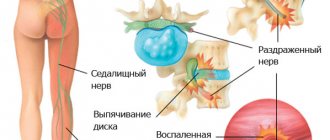Physical fatigue
This type of overfatigue develops gradually - a person first feels slight fatigue and low-intensity pain in muscle tissue, but usually few people pay attention to these signs. Continuing to carry out active work or engage in sports training without reducing the load, full-fledged physical fatigue occurs. In this case, the following symptoms will be present :
the feeling of fatigue is constantly present - even sleep and relaxation procedures do not relieve it;- muscle pain increases;
- sleep becomes restless - a person often wakes up for no apparent reason and has difficulty falling asleep;
- disturbance in the emotional background - a person becomes either apathetic and lethargic, or deliberately humorous and irritated;
- in the area of the anatomical location of the heart, unpleasant sensations appear, sometimes turning into pain;
- blood pressure rises, tachycardia is noted;
- The appetite of a person with physical fatigue is significantly reduced, and a white coating appears on the tongue. In some cases, the tongue trembles when protruded;
- body weight begins to decrease.
Please note: if the condition in question develops in women, then menstrual irregularities may begin.
If the above symptoms occur, you should immediately stop strenuous training or avoid physical labor - it will take time to select a recovery program. Doctors do not recommend completely abandoning your usual physical activities, you just need to reduce their intensity. The following can be used as therapeutic measures :
- Bathhouse. This is an effective remedy for recovery after hard physical labor, increasing performance and strengthening the immune system. A combination of a bath and massage would be optimal, but even without the latter, visiting a bath 1-2 times a week will help restore the body even after severe physical fatigue.
- Baths. They can be different - each of them has a certain impact. The most popular for physical fatigue are :
vibration bath - can activate the protective and restorative forces of the body, improves blood circulation, reduces the feeling of fatigue in the muscles, and stabilizes metabolic processes. The procedure for taking a vibration bath is carried out every day (every other day is possible) for 3-5 minutes, the total number of procedures is 15;- oxygen bath - especially effective for physical fatigue after injuries or diseases of the musculoskeletal system. The water in the bathroom is saturated with oxygen, a person should stay in the water for no more than 7 minutes, the duration of the daily course of procedures is 15;
- pearl bath - air bubbles pass through the water under high pressure, which promotes relaxation and reduces nervous tension. The water temperature of the pearl bath should be 37 degrees, the duration of one procedure is 10 minutes, they are carried out when visiting a bath or sauna;
- pine bath - it has a calming effect, but is necessary for physical fatigue. It is carried out for 10 minutes, the course is not limited, some doctors recommend taking pine baths at least 2 times a week.
- Shower. It is not enough to take a shower every day as a hygienic procedure - with properly selected shower effects you can help the body cope with physical fatigue. Remember :
- hot shower with water temperature +45 – has a tonic effect;
- rain shower – refreshes and soothes, reduces the intensity of pain in muscle tissue;
- cascade shower (a large amount of cold water falls on a person from a height of 2.5 m) – increases muscle tone;
- contrast shower – helps maintain the body’s performance during recovery.
- Massage. This procedure has a positive effect on the central and peripheral nervous system, the functioning of the digestive/cardiovascular systems, and improves metabolic processes in the body. When experiencing physical fatigue, it is very important to get a qualified massage, so it is advisable to seek help from specialists.
Duration of massage:
- legs – 10 minutes for each lower limb;
- back and neck – 10 minutes in total;
- upper limbs – 10 minutes for each arm;
- chest and abdomen area – 10 minutes in total.
If you are physically overtired, you can and should take a short vacation, but this does not mean that you need to lie down and lie without activity - this will not allow the body to fully rest. The best options to quickly get rid of physical fatigue without specific procedures :
- Take walks in the fresh air every day. Moreover, it is better to do this in parks/squares and during such walks you should not burden your brain with everyday problems - make every effort to ensure that your thoughts are only positive.
- Review your diet. Of course, you can’t go on a diet, but adding fruits, vegetables and lean meats to your daily menu would be quite logical.
- Be sure to take a course of vitamin therapy. You can consult your doctor about the choice of specific medications, but you can purchase multivitamin complexes on your own.
- Don't reduce your physical activity. You just need to change the type of activity - do a general cleaning of the house, work in the garden or vegetable garden.
Mental fatigue
This type of overwork is often perceived as ordinary fatigue and people try to restore their strength by simply sleeping or relaxing in nature. But doctors argue that in some cases such a change in activity will not be enough, it is necessary to undergo full-fledged treatment.
Symptoms of mental fatigue
Early signs of mental fatigue include:
recurrent headaches without obvious causes;- noticeable fatigue that does not disappear even after a night’s sleep;
- the skin of the face changes color (becomes pale or grayish), persistent bruises appear under the eyes;
- fluctuations in blood pressure;
- redness of the eyes;
- inability to sleep.
As the problem worsens, the person begins to experience nausea and vomiting, irritability and nervousness, loss of concentration, and memory impairment.
Important: in no case should you independently diagnose “mental fatigue” based on the symptoms described above! For example, increased blood pressure due to a headache may indicate problems with the cardiovascular system. Therefore, consultation with a doctor is necessary.
Stages of development of mental fatigue
The condition in question cannot appear suddenly and suddenly with all the accompanying symptoms - mental fatigue develops in a progressive rhythm.
Stage 1
The mildest stage of mental fatigue, which is characterized exclusively by subjective signs - a person cannot fall asleep even when very tired, after a night's sleep a feeling of fatigue persists, and there is a reluctance to do any work.
Stage 2
During this period, the condition in question negatively affects the general rhythm of life. At stage 2 of the disease, the following symptoms are added to the above symptoms :
- heaviness in the heart area;
- sense of anxiety;
- fast fatiguability;
- slight physical activity provokes trembling of the upper limbs (tremor);
- heavy sleep, with frequent awakenings and nightmares.
At the second stage of development of mental fatigue, disorders in the functioning of the digestive system appear, a person’s appetite decreases significantly, the skin of the face becomes pale, and the eyes are constantly red.
During the period under review, pathological changes begin to occur in the functioning of the whole organism. Men may experience a decrease in potency and libido, and in women the menstrual cycle is disrupted.
Stage 3
This is the most severe stage of the condition in question, which manifests itself as neurasthenia. A person is too excitable, irritated, there is practically no sleep at night, and during the day, on the contrary, productivity disappears due to the desire to sleep, the work of all organs and systems of the body is disrupted.
Stages 2 and 3 of mental fatigue necessarily require the help of professionals - this condition must be treated.
Treatment of mental fatigue
The basic principle of treating mental fatigue is to reduce stress of all types that led to the development of the condition in question.
At the first stage of the disease, complete rest is required for 1-2 weeks - a person should rest in a sanatorium, take quiet walks in the fresh air, and eat right. If necessary, you can take advantage of relaxing baths and aromatherapy sessions. After this, it will be possible to gradually introduce intellectual and physical activity into a person’s life, and in general, recovery will take at least 2 weeks.
The second stage of mental fatigue requires a complete “disconnection” from intellectual activity - of course, you won’t be able to “turn off” your brain, but it is quite possible to stop working on documents, reports, and projects. At this stage, you can engage in auto-training, undergo a relaxing massage course, or relax in a sanatorium or hospital. Full recovery will take at least 4 weeks.
The third stage of the disease in question is the person’s hospitalization in a specialized clinic. We are not talking about psychiatric centers - it is advisable to send a person with a severe stage of mental fatigue to a dispensary. For 2 weeks he will only rest and relax, then for 2 weeks the person engages in active recreation and only after that intellectual stress can be introduced into his life. The full course of treatment and recovery at the third stage of the condition in question will be 4 months.
If you feel that the first signs of mental fatigue are appearing, then do not wait for “events to develop.” Take a rest for at least 2-5 days, try to change the type of activity and engage in active recreation, attend auto-training courses, and conduct aromatherapy sessions with rosemary and mint oils every other day.
Important: under no circumstances should you take any medications if you are mentally fatigued! This can only lead to a worsening of the condition; for this condition, drug treatment is not provided at all.
Article:
Of course, it is important to maintain children’s interest in learning using modern information technologies.
You just need to not overdo it in this matter and remember that mental and physical health are more important than all knowledge combined. A child living in the 21st century is faced with a huge information flow from an early age, the sources of which are most often television, the Internet, school, kindergarten, books, parents and teachers. Of course, broadening one’s horizons and acquiring new knowledge has a positive effect on a child’s intellectual development. However, prolonged exposure to a saturated information environment may be unsafe for him. Why?
When a child is 6-7 years old, we can and must manage the situation; when a child is 13-14 and older, it will be more difficult to do this. Entering the virtual world is a real threat to the mental and physical health of modern children. If a child, with the TV and computer turned off, says that he is bored and has nothing to do, it means that we did not help him find and love alternative activities: reading, sports, walks or something else.
In the modern world, when demands on the level of education and intellectual capabilities of children are constantly increasing, the child is at the mercy of our parental ambitions. The child has not yet begun to walk and talk, and we strive to educate him in early development groups. Later the study of foreign languages, computers, choreography, swimming pool and much more are added. It is not surprising that nowadays the vast majority of children do not want to go to school. Even before school, their lives were scheduled minute by minute; there was no time left for games and children's creativity.
Fatigue is caused not only by intellectual overload, but also by a decrease in the duration of night sleep, disruption of daytime sleep, and insufficient exposure to fresh air.
Here are the norms for the duration of classes, sleep and walks for preschool children.
Duration of classes in preschool age
At 3-4 years old, the duration of classes should be 10-15 minutes, at 4-5 years old - 20 minutes, at 5-6 years old - 20-25 minutes, at 6-7 years old - 25-30 minutes. Of course, if a child is passionate about something, he can do it for much longer. If it does not harm his health, then there is no need to interfere.
Sleep duration in children
| Age | Sleep duration (hours) | ||
| Daytime | Night | Total | |
| 3-4 years | 2 | 10 | 12 |
| 4-5 years | 2 | 9,5 | 11,5 |
| 5-6 years | 1,5 | 9,5 | AND |
| 6-7 years | 1,5 | 9,5 | 11 |
Children's stay in the fresh air
Walking is the most effective form of relaxation. Walks are especially important for preschool children: in winter, at least 4-4.5 hours, and in summer, if possible, all day.
The smaller the child, the faster he develops fatigue. For example, in an infant, staying awake for 1.5-2 hours leads to fatigue even without vigorous activity. The child most quickly becomes fatigued in response to monotonous activity; 5-year-old children get tired faster than 6-7 year olds.
From the age of 5-6 years, children begin to actively master the computer. Unfortunately, recently there have been many families in which children, starting from an early age, spend most of the day at the computer. Naturally, they develop a computer addiction, and if the mother refuses to turn on the next cartoon, the child becomes aggressive and uncontrollable. Of course, computer games for preschoolers are an interesting and exciting activity. It gives the child a new way to assimilate knowledge, allows him to independently study various phenomena, and directly participate in what is happening on the screen. However, working on a computer causes a lot of stress and quickly leads to fatigue, which adults do not always notice. Children, however, also do not notice fatigue. The child’s eyes are no longer looking, his back is numb, and he exclaims in joyful excitement: “I’m not tired!” It is clear that this has a calming effect on parents, especially since the child is busy and does not bother anyone.
Physiologists have long proven that computer games are among the most strenuous activities compared to other types of computer activities and are considered more tiring than solving mathematical problems.
Moreover, in Japan and England, a syndrome of “video game epilepsy” was identified in children who are addicted to computer games from an early age, manifested by headaches, prolonged spasms of the facial muscles, blurred vision, and the appearance of negative character traits.
The time of onset of fatigue may vary not only in different children, but also in the same child in different cases; Depending on his condition, mood and other reasons, fatigue occurs at different times.
What signs can be used to determine if a child is tired:
• increased distractibility;
• frequent change of position;
• unusual movements of arms and legs (shaking, tapping, etc.);
• unpleasant facial expressions (grimacing, tics);
• uncontrollable outbursts of emotions (screaming, crying, jumping, etc.).
What can you do to prevent fatigue?
To prevent overwork, it is necessary to establish a child’s daily routine, completely eliminate lack of sleep, reduce workload, properly organize a change in mental activities and rest, and increase time in the fresh air. It is necessary to alternate mental work with physical exercises, and after classes provide children with a sufficiently long rest.
Frequent fatigue leads to overwork and deep behavioral disturbances, so it is important to recognize the causes of this condition in time and help the child.
The maximum duration of work on the computer should not exceed 10 minutes for children 5 years old, for children 6 years old - 15 minutes. It is also important to know that the visual system of children during preschool and primary school age is intensively improved. Since it is computer activities that cause the greatest visual fatigue, it is necessary to perform the following exercises.
"Brooms" . Keep your head straight. Blink, without straining your eye muscles, on a count from 1 to 10-15.
"Far close". Children sit freely near the window. The presenter first names a distant object, and after 2-3 seconds - a nearby one. Repeat 6-8 times.
"Owl". Close your eyes, without straining your eye muscles, on a count of 1-4, open your eyes wide and look into the distance on a count of 1-6. Repeat 2-3 times.
"Dress up the Christmas tree . When performing this exercise, the reference points for turning the head and body are toys, fairy-tale characters, etc. They are hung in different parts of the room. For example, a game object can be a Christmas tree that needs to be decorated. Children should look for the toys and animals needed for this purpose throughout the room with their eyes. The Christmas tree is placed or depicted in the center of the wall or slightly lower. Toys are hung in the corners of the room, under the ceiling, so that there is a need to turn your head in one direction or the other. The presenter asks to observe the following conditions: “Stand straight. Turning only your head, look for toys in the room that could be used to decorate the Christmas tree, and name them.” The pace of the exercise is arbitrary. Duration - 1 minute.
Overwork in children
It would seem - how overworked can children be? If they run, jump, scream almost around the clock and refuse to sleep even late at night? But it is precisely childhood overwork, according to doctors, that leads to serious health problems. Therefore, parents should carefully monitor the behavior of their children - the first signs of overwork in children may not be expressed.
Symptoms of fatigue in children
Overwork in children is preceded by severe fatigue. It is customary to identify the following external signs of fatigue (classification according to S.L. Kosilov)
| Fatigue | |||
| minor | expressed | sharp | |
| Attention | Rare distractions | Absent-minded, frequent distractions | Weakened, no reaction to new stimuli |
| Interest in new material | Lively interest | Weak interest, child does not ask questions | Complete lack of interest, apathy |
| Pose | Unsteady, stretching legs and straightening torso | Frequent changes of postures, turning the head to the sides, supporting the head with hands | The desire to put your head on the table, stretch out, lean back in your chair |
| Movements | Accurate | Uncertain, slow | Fidgety movements of the hands and fingers (deterioration of handwriting) |
| Interest in new material | Lively interest, asking questions | Low interest, no questions | Complete lack of interest, apathy |
Even at the very beginning of the development of the condition in question, parents can pay attention to:
- capriciousness/tearfulness of a usually cheerful child;
- restless sleep - the baby may cry out in his sleep, make erratic waves of his arms and legs;
- impaired concentration on some activity or subject.
In addition, the child’s body temperature may rise for no apparent reason (there are no signs of colds or inflammatory processes), the child experiences insomnia at night, and suffers from drowsiness during the day.
Children of school age, when overworked, lose interest in school, they lag behind in their studies, and begin to complain of headaches and weakness. Very often, overwork in children manifests itself in psycho-emotional disorders :
- unpleasant facial expressions;
- antics in front of adults and the mirror;
- mimicking others.
Adolescent children with this condition begin to be rude, snap, and ignore the comments and requests of adults.
Causes of childhood fatigue
Factors that provoke the development of overwork are considered to be:
- in infancy - violation of the daily routine (waking time exceeds sleep time), problems with breastfeeding;
- junior school age - physical and mental stress, constant homework, short sleep at night;
- senior school age - hormonal changes in the body, high study load.
It is worth considering that overwork in children can be caused by stressful situations at school and kindergarten, a dysfunctional family environment, and tense relationships with peers.
Treatment of overfatigue in children
Many parents consider the child’s behavior described above to be a kind of pampering - “he’ll sleep and everything will pass.” But doctors claim that such ignoring of children's overwork leads to neuroses, persistent insomnia, and fluctuating blood pressure readings.
Treatment of childhood overfatigue is a comprehensive approach to solving the problem. It is necessary to seek help from psychotherapists and pediatricians - they will prescribe auto-training sessions; often children only need to undergo a few massage sessions to fully restore their psycho-emotional background. The following measures also have a lasting effect :
- nutrition correction - we are talking about replacing fast foods with nutritious meals consumed at clearly defined hours;
- physical activity - this can be physical therapy or just playing sports;
- staying outdoors – active walks every day for 1-2 hours, regardless of climatic conditions.
If your child is overtired, the doctor may prescribe vitamin supplements or special biological supplements.
The doctor spoke about the dangers of overwork and its symptoms
Allergist-immunologist, assistant at the Department of Immunology, Russian National Research Medical University named after. N.I. Pirogova, head of the department of allergology and immunopathology of the Central Clinical Hospital of the Russian Academy of Sciences, Evgenia Parshina, in a conversation with the website aif.ru on Monday, November 23, told how overwork is dangerous, and also named its symptoms and ways to cope with it.
They didn’t call the doctor: how Russians self-medicate COVID-19
18% of sick people take antibiotics on the first day, 14% take immunomodulators
According to the specialist, the problem of overwork is extremely relevant in the modern pace of life. Thus, the irregular working hours inherent in many people require full dedication and lack of free time not only on weekdays, but also on weekends and holidays. Factors such as recent infectious diseases, poor sleep quality and insufficiency, lack of a structured diet and its imbalance, as well as lack of physical activity with daily mental workload and multitasking also contribute to the development of overwork. The situation is also aggravated by daily stress at work and at home.
According to Parshina, all this leads to overwork, which can be both physical and mental. If you are physically overtired, it is enough to simply rest and get enough sleep, as well as adjust your routine and always rest normally in the future, since you will not be able to get enough sleep. With the mental, the situation is more complicated, since it develops imperceptibly. Its symptoms include headaches, lack or increase of appetite, irritability and nervousness, lack and disturbance of sleep, apathy and fatigue, as well as slowness and decreased concentration. These factors lead to decreased performance.
The specialist emphasized that if you discover such signs in yourself, you should begin to correct them so as not to take your condition to the extreme, since the development
Machine opinion: the program will be entrusted with collecting data on Russian patients
Artificial intelligence will help doctors with an accurate diagnosis, but information leaks are not excluded
mental fatigue and the progression of its symptoms can seriously harm your health. She pointed out that many people escape from this state with alcohol, and this is fraught with problems in the family and with loved ones due to emotional instability. Problems also begin in the digestive system against the background of constant nervous experiences and stress, and then problems with the heart and blood vessels, which is why a person experiences sudden surges in blood pressure and metabolic disorders.
The doctor noted that people with overwork often exhibit characteristic external signs - pale skin, bruises under the eyes, deterioration in the quality of hair and nails, and bluish lips.
Parshina added that overwork can be deadly if a person overloads himself at work and is constantly overtired, works too hard and ignores health problems.
The specialist also spoke about how to cope with mental fatigue. First of all, you should organize your day in such a way that there is time for at least eight hours of sleep. It is also worth taking care of your diet and making it more balanced and not forgetting about physical activity, such as walking or exercise.
In addition, the immunologist advised that in order to get out of chronic fatigue syndrome and normalize the condition, we should devote time to those activities that we wanted to get involved in for a long time, but did not have enough time and energy. The main thing is that the hobby brings pleasure and positive emotions.
At the end of October, immunologist and allergist Marina Apletaeva refuted myths about the benefits of garlic and ginger in the fight against viruses. According to the specialist, onions, ginger and garlic contain many substances that have mostly antimicrobial activity.
Prevention of fatigue in adults and children
To prevent the development of overwork in adults, you just need to know a few rules for conducting normal life activities. This does not mean that you need to transfer to an easier job (this simply does not happen) or radically change your lifestyle - everything is much simpler. Follow these guidelines :
Weekends should really be days off—don’t take “work home.”- If you do physical work, then at home change the activity to mental.
- When doing mental work, on the contrary, do not ignore physical activity.
- Play sports - just take walks in the fresh air, visit the pool, or at least do morning exercises.
- Allow yourself to relax - a bathhouse, sauna, massage sessions, aromatherapy will serve as a prevention of mental and physical fatigue.
- Under no circumstances should you drink alcohol when the first signs of overwork appear—you won’t be able to relax, and your weakened body will receive a powerful blow from toxic substances, which will automatically lead to a worsening of your condition.
- Before going to bed, do not watch “heavy” films, do not listen to too active music - give preference to real relaxation: reading your favorite book, watching a comedy, knitting or embroidery.
To prevent overfatigue, parents should provide their children with:
supply of fresh air to the children's room - at a minimum, regular ventilation of the premises is required;- daily walks - no matter what the weather is like outside;
- good nutrition - fruits and vegetables, meat and dairy products should be included in the diet (if there are no medical contraindications for certain products);
- quiet games/activities - this is important to do before going to bed at night: reading a book, working on coloring pictures, putting together puzzles;
- proper distribution of periods of wakefulness and sleep - a child’s night’s sleep should last at least 9 hours.
Overwork is not just fatigue that can be relieved by regular sleep. It is necessary to clearly understand that a prolonged state of fatigue leads to serious health problems - after all, overload of the body entails pathological disturbances in the functioning of all its organs and systems.
Tsygankova Yana Aleksandrovna, medical observer, therapist of the highest qualification category
64, total, today
( 204 votes, average: 4.65 out of 5)
Pathologies of the central nervous system in newborns
Sciatica: symptoms and treatment










